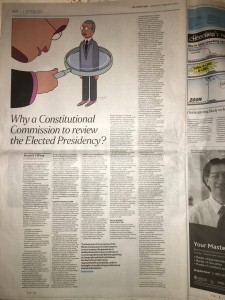Finance Minister Heng Swee Keat made his inaugural Budget speech in Parliament today. Access the full speech here. The broad structure and summary of his speech is as follows:
The Straits Times Opinion: Why a Constitutional Commission to review the Elected Presidency?
My Straits Times Opinion Article
 I wrote an OpEd for the Straits Times, “Why a Constitutional Commission to review the Elected Presidency?”, explaining the background to the recently appointed Constitutional Commission, which is only the 2nd one since independence. The previous one was in 1966.
I wrote an OpEd for the Straits Times, “Why a Constitutional Commission to review the Elected Presidency?”, explaining the background to the recently appointed Constitutional Commission, which is only the 2nd one since independence. The previous one was in 1966.
I opined on why the PAP Government did so when it had never found the need for it regarding all its constitutional amendments since 1966. I suggest the new political context where a PAP Government-backed candidate may plausibly lose the vote. This is amidst the backdrop of societies and voters moving further left in economic policies and also rising sensitivities as regards ethnic-religious minorities.
Update: make submissions to the constitutional commission
Submit in writing, signed, by 21 March, 5 PM. There may be public hearings for clarification and elaboration.
Submissions can be in Malay, Chinese, Tamil or English and need to be typed or legibly written by hand. The submissions must also be signed, whether in hardcopy or PDF form.
The precise dates of the public hearings will be announced in due course, but these will likely take place over a limited number of days between April 18 and May 15, 2016.
The submissions must be addressed to the Constitutional Commission Secretariat, and sent by post to 1, Supreme Court Lane, Singapore 178879, or e-mail to CCSecretariat@supcourt.gov.sg.
Unger, Phang, Politics & Prayer
“When philosophy has gained the truth of which it is capable, it passes into politics and prayer, politics through which the world is changed, prayer through which men ask God to complete the change of the world by carrying them into His presence and giving them what, left to themselves, they would always lack.”
- Roberto Unger, Knowledge and Politics (New York: Free Press, 1975) at 294.
“And, as the reader might have discerned by now, I do believe in God and in the higher knowledge that cannot be ours. And that explains why I believe that Unger (or any other theorist) cannot postulate an even close to perfect theory. That this is so is demonstrated by the complex mesh of critique and counter-critique that have, as their central focus, the influential theory or theories of the day. Indeed, Unger himself believed that to be so in Knowledge and Politics, although his present views are rather less obvious. I see nothing terribly frightening in this acknowledgment of the fallibility of human knowledge which we nevertheless continue to use whilst functioning as human beings. It also mandates a humility which has, in any event, always been the hallmark of the great scholars of our time.”
- Andrew Phang, “Toward Critique and Reconstruction. Roberto Unger on Law, Passion and Politics”, Hull University Law School, Studies in Law (1993) at 78